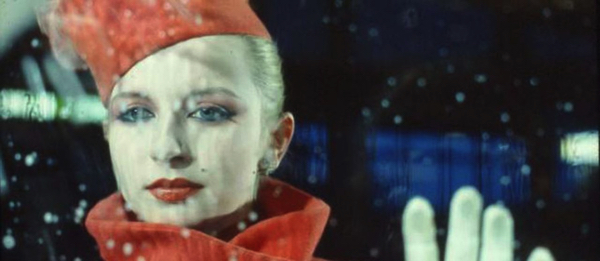
Dir.: Ulrike Ottinger; Cast: Tabea Blumenschein, Lutze, Magdalena Montezuma, Orpha Termin, Monika von Cube, Nina Hagen; W. Germany 1979,108 min.
Filmmaker, painter and photographer Ulrike Ottinger (1942-) was one of the most important German filmmakers of the 1970s and awarded the Berlinale Camera at this year’s 70th festival which also premiered her latest autobiographical feature Paris Caligrammes.
She is probably best known for her drama Freak Orlando (1981) a potted history of the world in five episodes with a focus on man’s incompetence, cruelty and thirst of power. Ticket of No Return chronicles the West Berlin punk scene, a decade before the wall came down. It would be the first part of her Berlin trilogy. Actor, producer and costume designer Tabea Blumenschein, who died in Berlin this March at the age of 67 influenced the film. She works as a designer (for Andy Warhol) and chanteuse in many of the capital’s nightclubs.
The drama follows She (Blumenschein), an elegant woman from the posh 16th Paris arrondissement of Auteuil, who flies Berlin/Tegel on a single ticket where her only aim is to drink herself to death in style. Designed during the 1960s Tegel Airport was a highly efficient modern hob of transport and shopping in contrast to Tempelhof, with its traditional implications of the Third Reich. She lands there as if from another universe, and will cause mayhem wherever she goes. At the Zoo station She comes across the local Zoo alcoholic (Lutze), and the drinking competition kicks off, to minimal dialogue, voiced by Montezuma Meanwhile ‘the down-to-earth-earth approach’ is handed to von Cube. Nina Hagen features as a chanteuse in a pub frequented by taxi drivers.
A woman’s voice from the informs us that She represents every woman: Medea, Madonna or Beatrice. Not that it matters: these two suicidal lushes are really just terribly loneliness, their drinking bringing thetogether in an act of vacuous solidarity. There are some hair-raising incidents: the two of them are tied to the front of a car that speeds through burning walls, and their stiletto heels destroy the illusion of anything that could be termed voyeuristic. Ottinger is not interested in reality, or even rational – drinking is a serious occupation, to be treated with respect. What takes centre stage here is not West Berlin’s new Economic miracle, but a shadowy world lowlifes, drinking themselves to oblivious as they singing away the troubles of the past.
A startling score competes with the visual overload of this extraordinary collage that echoes Fellini and Schroeter. That said, the symbolism of glass, mirrors and lights sometimes overreaches itself. Clearly Ottinger is still feeling her way forward in this sophomore drama at a time when the mood in the Federal was rather pleased with itself and its economic miracle, Ticket was a radical rejection of everything that could be construed as a success. AS
SCREENING AS PART OF WE ARE ONE FESTIVAL | 1 JUNE 2020